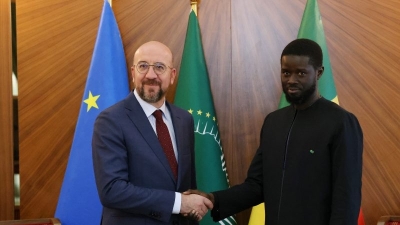Health brief: The unbeatable ‘as old as humanity’ disease

The fight against the ‘as old as humanity’ disease in Europe stagnated: Most recent data suggests that eliminating tuberculosis (TB) by 2030 is impossible if nothing changes.
In ancient Egypt, around 600 BC, a 50-year-old woman called Irtyersenu died.
After around 2,600 years, her mummy was found in Thebes, a city along the Nile about 800 kilometres south of the Mediterranean Sea, and brought to the British Museum.
After the first-ever medical autopsy of an Egyptian mummy, done by Augustus Bozzi Granville and described to the Royal Society of London in 1825, it was suspected that the woman died from ovarian cancer.
Decades later, in 2009, a team of researchers in London gave another cause of death for the woman: Tuberculosis – which was widespread in ancient Egypt.
Unsurprisingly, infectious diseases leading expert David L. Schlossberg referred in a book to tuberculosis as ‘as old as humanity itself’.
Tests, drugs, and even a vaccine were developed following that discovery. However, getting rid of it turned out to be a challenge.
Human organisms can kill TB-causing bacteria without any symptoms. In addition, TB symptoms might not show up for years – and even if they do, it is not easy to detect the bacteria.
“A rough estimation is that 1/4 of the world population is infected with tuberculosis,” said Senia Rosales-Klintz, a tuberculosis expert at European Centre for Disease Prevention and Control (ECDC), in a podcast on Friday (24 March).
To finally get rid of tuberculosis once and for all, the World Health Assembly in 2014 adopted the post-2015 End TB Strategy, which aims to end the global TB epidemic as part of the UN Sustainable Development Goals (SDGs).
This means reducing TB incidence by 80% and TB deaths by 90% before 2030, compared with 2015. For the EU, “the specific goal” is turning over 4,400 deaths caused by tuberculosis in 2015 into less than 400 deaths by 2030.
But the latest surveillance data from 2021 published on Friday (24 March) by ECDC and WHO/Europe showed that the overall number of estimated TB deaths for the EU/EEA in 2021 was the same as in 2015 – 4,400.

Standing still
Worryingly, these findings represent an increase against 2020, when 3,600 deaths were reported.
“The progress to end tuberculosis has stalled, even been reversed,” ECDC director Andrea Ammon told reporters.
A part of SDGs is an 80% reduction in the TB incidence rate in 2030 compared to 2015. This figure continued to decline in the EU/EEA countries in 2021, with an annual decline of nearly 7% per year for the past five years.
“What we’re seeing is not enough,” Ammon warned, as the rate should reach nearly 12% to meet the goals, meaning that Europe will not achieve the 2030 SDGs for tuberculosis.
Moreover, notification rates should be interpreted cautiously due to the impact on TB clinical services and surveillance across the EU/EEA during the COVID-19 pandemic, which continued throughout 2021.
While most countries in Western Europe appear to be on track for tuberculosis elimination, Eastern Europe continues to experience a high burden of tuberculosis.
And large proportion of the cases came from a few countries, including Romania, which reported almost a quarter of all TB cases in 2021.

Countries are also challenged by multi-drug resistant (MDR) tuberculosis – a form of disease resistant to the two main antibiotics and extensively drug-resistant tuberculosis, leaving fewer options to treat patients.
Ukraine, one of the countries responsible for most of the TB cases in the WHO/Europe region, has the fifth-highest number of confirmed cases of extensively drug-resistant TB in the world.
“The ongoing war in Ukraine and the potential for increases in the number of TB cases in our area,” warned Marieke van der Werf, head of the tuberculosis department at ECDC.
The data on Ukraine presented on 24 March does not yet allow us to see the effects of the humanitarian crisis in the war-torn country.

A look at the future
The true impact of the COVID-19 pandemic on TB is also to be seen once data from 2022 and onwards is collected. Most hypotheses suggest an increase in the number and clinical severity of cases in the coming years.
“Prior to the COVID pandemic, the European region was on a good path with the fastest decline in TB incidence and mortality globally. Numerous crises contributed to reversing the gains,” said Stela Bivol, joint Infectious Diseases Unit lead at WHO/Europe.
She highlighted that the European region is “a region where ending tuberculosis remains unfinished business yet a region that has the know-how to end TB”.
Recent technological advancements are promising, though. A long path has been walked since the disease was known as ‘king’s evil’ and treated by a royal touch in England and France.
Now treatment regimens are just six months long for both TB and drug-resistant TB, while diagnosis can be completed within hours. Digital solutions are also reshaping TB response.
What is still missing among the tools, according to ECDC’s Rosales-Klintz, are new vaccines. There is only one vaccine, Bacillus Calmette–Guérin (BCG) vaccine, first used in humans in 1921, administered mainly for children.
“It’s not good enough,” Rosales-Klintz said.
On the 22nd of September, the world leaders will meet in the high-level follow-up meeting on tuberculosis as part of the UN General Assembly to commit to new targets and set new milestones to end this ‘as old as humanity’ disease.

Ukraine’s fight against tuberculosis
Marking world Tuberculosis day (24 March) we are talking with two Ukrainians about how Ukrainians are fighting not only Russia’s invasion but also one of the highest incidences of TB cases in the European region.
Leading thinkers and decision-makers from across the medical technology sector will gather for Europe’s leading medical technology industry event from 30 May to 1 June. Organised by MedTech Europe, in cooperation with the Irish Medtech Association, The MedTech Forum is an opportunity to learn and create connections in this dynamic sector.
Register here >>
Arłukowicz, the chair of new health subcommittee. In its first-ever meeting, the Polish centre-right MEP Bartosz Arłukowicz was elected by acclamation as chair of the brand-new European Parliament’s public health subcommittee (SANT).
Ongoing delays of pharmaceutical package. The unveiling of the much-awaited reform of the EU’s regulatory framework for pharmaceuticals has been pushed back to a later date for the third time in just a few months, EURACTIV has learnt.
The further postponement of the publication of the EU pharma legislation has caused tensions among EU lawmakers and health stakeholders, who have demanded the Commission expedite it to start the legislative process on time.
On Monday (27 March), ENVI Chair Pascal Canfin, on behalf of the committee, sent a letter to the health commissioner Stella Kyriakides in which he urged to present the Commission’s proposal on the pharmaceutical package “in April 2023 at the very latest”.
According to a new indicative agenda of the Commission for the next months, the package is expected to be unveiled on 26 April. On Thursday (30 March), Kyriakides will exchange with MEPs in the ENVI committee.
EMA’s chief’s exchange with vaccine-sceptic MEPs. European Medicines Agency (EMA) chief Emer Cooke assured that COVID-19 vaccines are safe and side effects are being monitored in response to criticism from vaccine-sceptic MEPs.
MEP on mental health strategy. Pain management should be included in the forthcoming Commission’s mental health strategy to relieve those “who are suffering in silence”, according to a socialist MEP, Alex Agius Saliba.
Pfizer and Ursula. EU Health Commissioner Stella Kyriakides insisted that EU executive chief Ursula von der Leyen had no role in negotiating COVID vaccine contracts during a heated hearing before the European Parliament’s Special Committee on COVID-19 (COVI) on Monday (27 March).
Commission renegotiates vaccine deals to quell overstocking. The European Commission began negotiations with COVID-19 vaccine producers to change the conditions of previously agreed-upon contracts, reacting to increasing pressure from member states that do not want to pay for vaccines they no longer need.
Medicines being discussed. Find which medicines are being discussed at EMA’s human medicines committee CHMP meeting on 27-30 March here. The committee highlights will be released on Friday (31 March).
Mid-term achievements of EMA. On Wednesday (22 March), EMA published a mid-term report summarising the achievements of its Regulatory Science Strategy (RSS) to 2025. Emer Cooke, EMA’s Executive Director, commenting on the report, said, “we have made considerable progress in advancing regulatory science to build a more adaptive regulatory system that encourages innovation in human and veterinary medicines”.
Call to support cracking healthcare systems. On Wednesday (22 March), representatives from 49 out of 53 Member States in WHO’s European Region, together with health workers, academics and experts, adopted a declaration urging political action and commitment to protect, support, and invest in health and care workers across Europe and Central Asia. “The health workforce crisis in Europe is no longer a looming threat – it is here and now. Health providers and workers across our Region are clamouring for help and support,” said Hans Kluge, WHO Regional Director for Europe.
Call to ensure safe water, proper sanitation and hygiene worldwide. On world water day, Wednesday (22 March), WHO and UNICEF jointly called “on all nations to radically accelerate action to make water, sanitation and hygiene (WASH) a reality for all”, as 2 billion people worldwide lack safe drinking water and 3.6 billion people – almost half the world’s population – use sanitation services that leave human waste untreated. Unsafe water and poor sanitation are linked to the yearly mortalities of at least 1.4 million people.
One Health. On Monday (27 March), the Quadripartite platform – a coalition of four international agencies: the Food and Agriculture Organization of the United Nations (FAO), the United Nations Environment Programme (UNEP), the World Health Organization (WHO) and the World Organisation for Animal Health (WOAH) – called for enhanced global action for One Health. “To build one healthier planet, we need urgent action to galvanise vital political commitments, greater investment and multisectoral collaboration at every level,” a press release following their first annual face-to-face meeting said.
Disruption of access to NCD medicines during the COVID-19 pandemic. The WHO report Access to NCD medicines: emergent issues during the COVID-19 pandemic and key structural factors, published on Wednesday (22 March), found that there is an urgent need to improve the transparency of the overall pharmaceutical information ecology as a foundation for pandemic planning and response. “If we are unable to identify weaknesses in the global NCD supply chain, we cannot hope to mend them,” WHO’s press release said.
Private sector’s influence on health. A Series on the commercial determinants of health published in the scientific journal The Lancet on Thursday (23 March) found that a substantial group of commercial actors are escalating avoidable levels of ill health, planetary damage, and inequity—the commercial determinants of health. WHO Director-General Tedros Ghebreyesus, in a commentary within the series, said: “It is time for a paradigm shift. Public health cannot and will not improve without action on the commercial determinants of health, from the local to global level. New forms of public health governance are needed.”
HELSINKI
Finland denies having promised free abortion to Polish women. The Finnish government did not promise Polish women free abortions, denying claims Polish MEP Robert Biedroń made at the start of March. By Aleksandra Krzysztoszek | EURACTIV.pl
THE HAGUE
Survey: Mental health issues affect half of young Dutch. Over half of the young Dutch aged 16-25 are dealing with mental health issues, of which many struggle with suicidal thoughts and loneliness, a survey recently published by the National Institute for Public Health and the Environment (RIVM) shows. By Benedikt Stöckl | EURACTIV.com
27-31 March – The first WHO global (hybrid) meeting on skin-related neglected tropical diseases
29 March – WHO EPI-WIN webinar on the H5 avian influenza
29 March – Measures to fight stigma against HIV, event organised by the EESC
29 March – The potential for academic development of medicines in Europe
29-30 March – European Parliament plenary in Brussels
30 March – World Bipolar Day
3-5 April – Fifth Global Forum on Human Resources for Health
7 April – World Health Day



